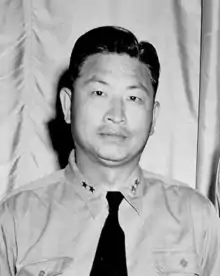Sohn Won-yil
Sohn Won-yil (June 22, 1909 in Nampo – February 15, 1980) was a South Korean naval vice admiral best known for being the first Chief of Naval Operations (CNO) of the Republic of Korea Navy. As one of the founding members of the Republic of Korea Navy, Sohn is generally regarded as the founder of the South Korean navy.[1]
| Sohn Won-yil | |
 Sohn in 1949, during his tenure as a rear admiral. | |
| Korean name | |
|---|---|
| Hangul | 손원일 |
| Hanja | 孫元一 |
| Revised Romanization | Son Wonil |
| McCune–Reischauer | Son Wŏnil |
Career

Shortly after Korea was liberated from the Empire of Japan on August 15, 1945, Sohn Won-yil, a former merchant mariner and son of the independence activist Sohn Jung-do,[2] led the Maritime Affairs Association. The Association evolved into the Marine Defense Group on November 11, 1945 (later became Navy Foundation Day) and later became the Korean Coast Guard, which was formed in Jinhae. After the new Republic of Korea government was established on August 15, 1948, the Korean Coast Guard has formally renamed the Republic of Korea Navy, and Sohn became the first Chief of Naval Operations of the ROK Navy on September 5, 1948.[3]
After relieved from the service, he was appointed as the fifth Minister of National Defense, and the first ambassador to West Germany.
Legacy
In honor of Sohn, the ROKS Sohn Won-yil (SS 072), the first of Sohn Won-yil class submarines, was commissioned in 2007, named after him.
References
- The Father of the ROK Navy: The Late Admiral Sohn Won-Yil". Republic of Korea Navy Official Website. Retrieved October 12, 2008.
- "손원일 중장" Archived 2007-10-11 at the Wayback Machine. War Memorial Museum Official Website. Retrieved May 2, 2007.
- "Commander, U.S. Naval Forces Korea: The Early Years (1945 to 1957)". Commander U.S. Naval Forces Korea, U.S. Navy Official Website. Retrieved March 4, 2007.